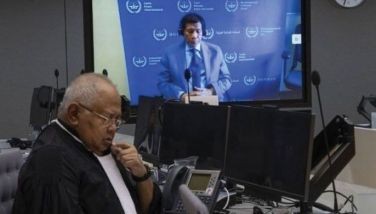The state of labor 26 years from EDSA 1
Twenty-six years ago, the Filipino people made history by staging what today has become a global model for a bloodless overthrow of monarchies and dictatorships. The working class and the middle class collaborated to dismantle an oppressive regime that became too callous to the sufferings of the masses. What, in contemporary times, have Libya, Syria and other repressive regimes, failed to achieve without bloodshed, our people had shown to the world, without a shadow of doubt, that only in the Philippines, could we replace the entire government without bloodshed and social upheaval. To reward the labor sector then for its pivotal role in the revolution, the then revolutionary president took strong initiatives to make the government truly for the people, of the people and by the people.
First, President Cory Aquino installed a pro-people, pro-poor and pro-social justice cabinet with progressive thinkers and leaders like Rene Saguisag, Bobbit Sanchez, Nene Pimentel and Joker Arroyo. She pardoned the peasant leader, Bernabe Buscayno, aka Kumander Dante, and transformed him into a leader of the cooperative movement, and released from detention the self-proclaimed leader of the left, Joma Sison. She then opened the dialogues with both the leftist and rightist extremists.The President appointed men and women of unimpeachable integrity to the Judiciary like Claudio Teehankee, who was so unlike others today (he had no undeclared bank accounts and condos).
As the sole legislative authority under the Freedom Constitution, the President enacted the Comprehensive Agrarian Reform Law and opened the door to the ultimate distribution to the farmers the hundreds of thousand hectares of the Hacienda Luisita. The first female Philippine President also legislated many revolutionary laws like the statute that afforded the right to unionize and to collective bargaining to security guards and government employees. She amended the Family Code and emphasized the need to protect the Filipino family, the women, the children, the widows and orphans. She took bold moves to infuse the civil service with means for the empowerment of the government personnel. She put good men and women in DOLE, SSS, GSIS and other agencies that directly served the masses.
The most historic milestone however was the 1987 Constitution. President Cory Aquino convened a group of socially committed people whom she tasked to formulate a new constitution. Brave and pioneering men and women like Blas Ople, Fr. Joaquin Bernas, Jaime Tadeo, Sister Christine Tan, Christian Monsod, and of course, our very own Hilario G. Davide Jr. and Regalado Maambong. They were given a deadline, and true enough, these courageous Filipinos wrote and presented to the Filipinos a Charter that was not only very nationalistic and pro-people, but was pro-human rights and pro-environment, as well. It provided substantive protection for the working class, including subsistence farmers and fishermen, landless tenants, indigenous cultural communities. It was ratified overwhelmingly by the Filipinos.
The Preamble expressed the collective dream of all, which is “TO BUILD A JUST AND HUMANE SOCIETY.” Unlike the 1935 and 1972 Charters, which were very political, and whose main goal was “TO ESTABLISH A GOVERNMENT,” the Constitution of 1986 was very socially oriented and sought to stress that the Government exists for the people, not the people for the Government. Institutions like the COMELEC, COA and CSC, as well as the Ombudsman and the SANDIGANBAYAN were strengthened to promote integrity and the merit system in public service. The new government raised the expectations of the people and made them proud to be Filipinos again. People wanted to work for and in government and public service became a badge of honor once more.
Most of all, for the working class, the Constitution, for the first time in our history, enshrined more daring rights for the workers, like the right to strike, the right to participate in policy and decision-making, the right to a living wage, the right to a just share in the fruits of production, the right to just and humane conditions of work, the right to full employment. And most importantly, the state has been mandated to afford full protection to labor, organized or unorganized, local and overseas. The Labor Code was amended to give impetus to unionism and collective bargaining as just and viable means at the empowerment of the working class. Senator Boy Herrera (Cebu and Bohol) and Congressman Bert Veloso (Leyte) authored RA 6715, a landmark statute that empowered the unions in collective bargaining and peaceful concerted actions.
Today, as we look back with painful nostalgia to the glory that was EDSA, we are dismayed to see more poor workers, millions of jobless, homeless, and hopeless. The cost of living is unreachable. Education and medical care are unaffordable. Oil prices are beyond the control of government. But wages are pegged, way below the real level of living wage. We have a very honest, hardworking Labor Secretary but she is holding a flickering candle inside a catacomb of socio-economic stench and political decay.
President Cory must be crying in her grave, and Senator Ninoy must be cursing the “slings and arrows of outrageous fortunes.” Aren’t we losing the dreams of 1986?Was EDSA worth it all? I sadly rest my case, Your Honor.
- Latest
- Trending



























